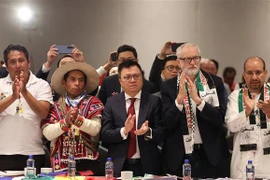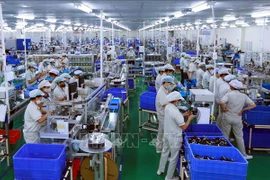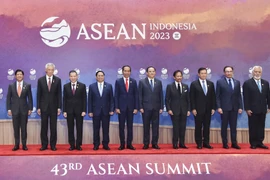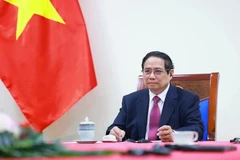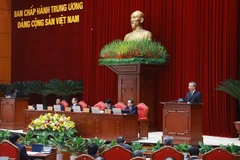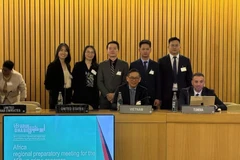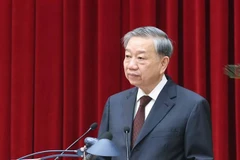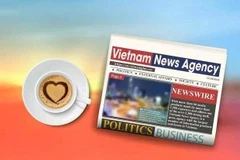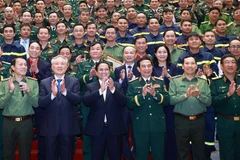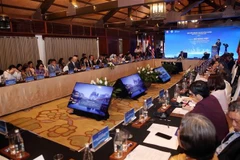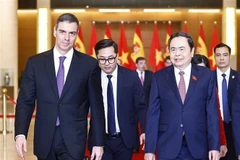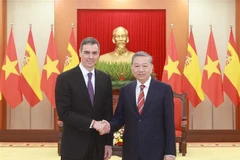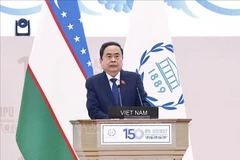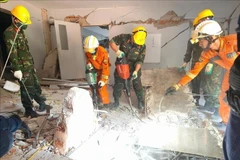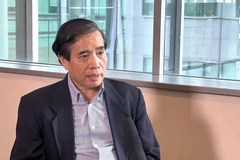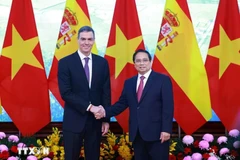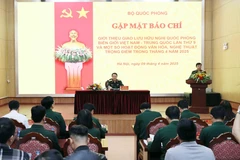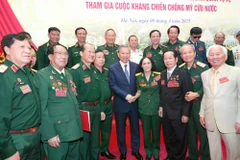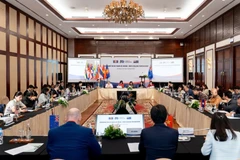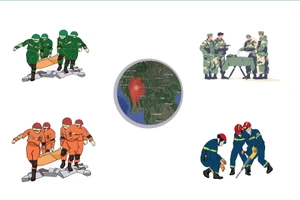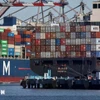Hanoi (VNA) – Party General Secretary To Lam has written an article highlighting Vietnam’s rise to prominence in international integration. The Vietnam News Agency (VNA) introduces a translation of the article:
RISING IN INTERNATIONAL INTEGRATION
To Lam
General Secretary of the Communist Party of Vietnam Central Committee
Looking back at our nation's revolutionary history, Vietnam's integration and development have always been tied to the transformative currents of each era. From the earliest days of our independence, in a letter addressed to the United Nations, President Ho Chi Minh clearly articulated Vietnam's aspiration to be a friend with all countries, expressing a desire "to implement an open policy and cooperation in all fields." This can be considered the first "declaration" of the Democratic Republic of Vietnam's approach to the international community.
The philosophy of “combining national strength with the strength of the times” has been creatively applied by our Party over the past 80 years, consistently linking our national revolution with the progressive trends of the era and humanity’s common aspirations.
Stepping into the renewal period, our Party determined that to achieve peace and development, it is a must to open the door to the outside world and cooperate with other nations, with international integration representing the highest forms and level of international cooperation. In the other word, international integration means “placing our country in the mainstream current of the times, beating with the same rhythm, and breathing the same air of the era”, enhancing our strength through global connections. The Party established a policy of international integration, first economic integration then comprehensive integration to expand relations with countries and international organisations, leveraging external resources for socio-economic development and elevating the nation’s role and position, integrating Vietnam into the global politics, international economy, and human civilisation.
Our country is now entering an era of the nation's rise for prosperity and strength, toward a "wealthy people, strong nation, democratic, equitable, and civilised society" that demands a new mindset, position, and approach to international integration. The Politburo’s introduction of Resolution 59-NQ/TW on January 24, 2025 regarding "international integration in the new situation" marks a "breakthrough decision" and a historic turning point in the country's integration process by positioning international integration as a crucial driver propelling the country into a new era. This transition moves from reception to contribution, from deep and broad integration to full integration, from the position of a latecomer to the status of a rising nation pioneering in new fields.
Our Party has viewed international integration as a critical strategy to strengthen political position, promote economic development, ensure national security, and elevate the country’s influence on the world map. International integration has gradually evolved through various periods, from limited, selective integration with ideological considerations and initial pure economic integration to today’s “broad, comprehensive integration.” The 9th National Party Congress first introduced the “international economic integration” policy. The 11th National Party Congress marked a shift in mindset, from “international economic integration” to “international integration in all areas.” The Politburo’s Resolution No.22-NQ/TW on international integration dated April 10, 2013 concretised the international integration policy with the guideline of “proactive and active international integration.” Most recently, this strategic direction was furthered developed and refined into “proactive, active, comprehensive, extensive, and effective international integration” at the 13th National Party Congress.
In 40 years of renewal, Vietnam's international integration process has achieved important results of historic significance. From an isolated and embargoed country, Vietnam has established diplomatic relations with 194 countries worldwide and formed Strategic Partnerships and Comprehensive Partnerships with 34 nations, including all permanent members of the UN Security Council and major countries. Vietnam has been an active member of over 70 regional and international organisations, with deep, substantive political, defence, and security relationships. From a poor, backward economy at a low level of development and under embargo and sanctions, Vietnam has become one of the world's 34 largest economies, with an economic scale nearly 100 times larger than in 1986 and per capita income rising from under 100 USD to nearly 5,000 USD. Engagement in multi-tiered international economic cooperation agreements and linkages, particularly 17 free trade agreements (FTA) has connected Vietnam with more than 60 key economies, enabling deeper participation in global production and supply chains, positioning Vietnam in top 20 countries with the largest trade volume in the world, top 20 economies attracting the biggest volume of foreign investments, and top 10 countries receiving the largest remittances globally.
However, looking at the overall picture seriously and objectively, the results of implementing international integration policies still fall short of expectations and set goals, failing to meet development requirements, with many constraints, bottlenecks, and barriers impeding the progress. International integration brings not only numerous opportunities but also challenges and downsides such as unfair competition, unsustainable growth, widening wealth disparities, environmental pollution, risk of “going astray,” “cultural invasion,” “self-evolution,” “self-transformation,” and “erosion of trust” internally.
The world is standing at the threshold of fundamental era-defining changes, undergoing profound transformations in all aspects under the influence of major political, economic, cultural, social, and scientific – technological shifts. The period from now to 2030 is the most crucial phase for shaping and establishing a new world order. These changes are creating a more multidimensional international environment, opening up tremendous opportunities alongside significant challenges for our country. In this transitional period between the old and the new, medium and small countries often find themselves in reactive positions, unable to adapt quickly enough. In this transformation, if we fail to promptly catch up with the world, recognise and seize opportunities to place our country in the right current of the times over the next 10-20 years, the risk of falling behind will be more real than ever before.
The strength of the current era lies in global political, economic, and social trends such as peace, cooperation, and development, and the trend of democratising international relations, sustainable development, and economic cooperation and connectivity. It is the power of the international consensus on building and reinforcing a multipolar, polycentric, democratic, fair, and equitable world, based on international law, and especially the ongoing science-technology revolution, which is opening up endless development opportunities based on knowledge and human potential.
At this historic moment, the country needs historical decisions. Building on the estabished values, Resolution 59 captures the flow of the era's strength and "elevates" international integration with highly revolutionary, groundbreaking, national, scientific, and contemporary perspectives.
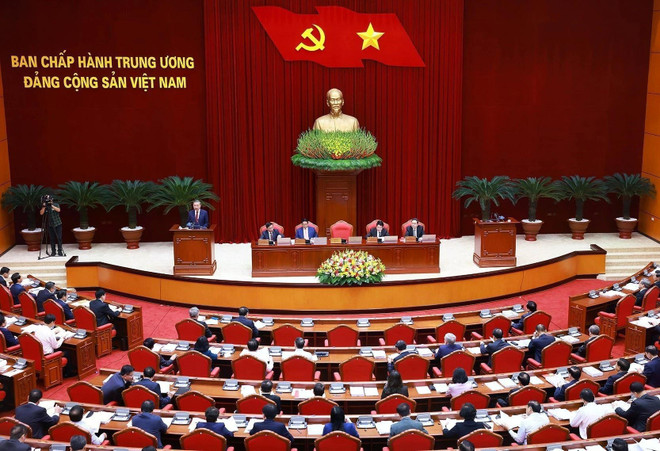
Firstly, alongside national defence and security, "promoting external affairs and international integration" is a crucial and regular task. The key and regular spirit in international integration is to optimise external resources and favourable conditions for the goal of protecting the homeland and developing the country early and from afar, and ensuring the highest interests of the nation, as well as the best interests of the people.
Secondly, in terms of perception, international integration must be an endeavour of the entire people and the whole political system, under the leadership of the Party and the management of the State. The people and businesses are taken as the centre, subjects, driving forces, main forces, and beneficiaries of international integration. Integration should go with ational identity perservation, not dissolution.
Thirdly, international integration must be based on intrinsic strength, which plays a decisive role, with the enhancement of internal strength going hand in hand with utilising external resources. Internal strength serves as the main resource and the root for power, so it must always be promoted to ensure proactivity, independence, and self-resilience. At the same time, it is essential to make the most of external resources to complement and enhance internal strength. A harmonious combination of national strength and that of the era would create the power of Vietnam in the era of the nation’s rise.
Fourthly, international integration is a process of both cooperation and struggle, that means “cooperating to struggle and struggling to cooperate.” It is important to focus on partnership and limit confrontation, and at the same time, respect the fundamental principles of the United Nations Charter and international law. In the process of integration, it is a must to demonstrate the spirit of being an “active and responsible partner” of the international community, staying ready to contribute to the common efforts of the region and the world.
Fifthly, international integration must be "concerted, comprehensive, intensive, and extensive," with fields closely linked and complementing each other in an overall strategy, with a clear focus and appropriate roadmaps and steps.
We are facing the need for a revolution with strong, comprehensive reforms for development. Along with the "spirit of innovation" in restructuring the organisational apparatus of the political system as outlined in Resolution No. 18, and the "breakthrough thinking" on science-technology development, innovation, and national digital transformation in Resolution 57, the orientation on international integration as the “action manual” of Resolution 59 will create a "strategic trio" with a focus on "Long-term stability - Sustainable development - Improved quality of life," as outlined by the Party. In this revolutionary phase, we need to implement decisive and effective actions in the following directions:
Firstly, new mindset, awareness, and actions in international integration must be deeply grasped and put into practice. Accordingly, the consciousness of proactive and active international integration in a harmonious, comprehensive, intensive, extensive, and effective manner is a major strategic direction of the Party, serving as an important driving force for the development and safeguarding of the Fatherland, the achievement of social progress and justice, the protection of the environment, and the preservation and promotion of the national cultural identity. This must be unified from the central to local levels, and extended to every organisation, individual, and business. The Party and State's guidelines and policies on international integration, along with the requirements, tasks, opportunities, benefits, responsibilities, and obligations of Vietnam in this work, need to be widely disseminated and deeply understood throughout the Party, the people, and the army.
Secondly, economic integration is identified as the core, and integration in other fields must facilitate economic integration, with the top priority being restructuring the economy, renewing the growth model, and promoting digital transformation. Focus should be placed on sectors with advantages and potential, and priority should be given to mobilising resources for key sectors and projects such as strategic infrastructure in transportation and energy, including high-speed railways, expressways, seaports, airports, and nuclear, wind and solar power plants, and those reducing emissions, and achieving carbon neutrality to avoid wastefulness and achieve high efficiency, especially in the context of digital transformation and the ongoing Fourth Industrial Revolution. It is essential to bring into full play international economic commitments, agreements, and linkages, particularly new-generation Free Trade Agreements (FTAs), to enhance mutually beneficial interests and avoid dependence on certain partners. Domestic institutions should be consolidated to improve the capacity of implementing international commitments and agreements. Special mechanisms and policies should be developed to attract high-quality foreign direct investment (FDI), especially in important emerging sectors and new drivers for labour productivity growth, such as information technology, telecommunications, semiconductors, and artificial intelligence. Appropriate policies should be in place to encourage foreign investors to transfer technology, governance, and professional skills to Vietnamese enterprises and labourers. Vietnamese businesses should be encouraged to invest and do business effectively abroad, and build national brands with international standing.
Thirdly, the political, security, and defence integration must aim to strengthen the nation’s capacity and position, and protect the nation early and from afar, before the country is in danger. International integration must effectively utilise established partnerships to promote political trust, mobilise resources for development, resolve outstanding issues through peaceful measures, and strengthen cooperation based on respect for and compliance with international law. The nation must strengthen coordination with partners to effectively address traditional and non-traditional security challenges, including the East Sea issue, water security, food security, pollution, epidemics, cybercrime, and transnational crime. With new position and strength, we can take on a core, leading and reconciling role in appropriate fields; contribute more actively to international peacekeeping, search and rescue activities; and diversify defence and security cooperation, and develop a self-reliant and modern and dual-use defence and security industry.
Fourthly, science, technology, and innovation must be identified as top important breakthroughs, drivers for the rapid development of productive forces, thus improving production relations in line with Resolution 57. Therefore, international integration in these fields must aim at aligning domestic standards and regulations on science and technology with advanced international norms and practices. This will quickly improve national competitiveness, expand the country's development space, mobilise and take advantage of international resources and strongly promote domestic resources to develop prioritised and spearhead industries, emerging sectors and innovation fields.
Fifthly, comprehensive integration in culture, society, tourism, environment, education - training, health care, and other sectors must be promoted. In terms of culture, integration should be linked with the preservation, promotion, and introduction of national culture; developing cultural industries, content industries, and high-quality cultural products and brands with global competitiveness capacity. In health care, cooperation in research and application of science in public health care should be strengthened, along with developing specialised international-standard medical centres that integrate both Eastern and Western medicines to treat diseases. In education and training, efforts should be made to standardise, innovate, and improve the quality of domestic educational institutions to match regional and international standards. In tourism, attention should be paid to expanding and diversifying markets, focusing on high-potential markets with large numbers of visitors, high spending, and long stays. For labour, it is necessary to implement mechanisms to develop high-quality human resources, enhance lifelong learning skills, and increase the capacity and productivity of the Vietnamese labour force. Above all, a strategy should be outlined for the development of Vietnamese people of the "rising generation” so that by 2045, young men and women in their late teens and twenties will stand shoulder to shoulder with their international peers in both intellect and physicality.
Sixthly, it is important to address bottlenecks in implementing international commitments and agreements, and accelerate the finalisation of institutions and policies, focusing on efforts to review and incorporate international laws into domestic laws to fully, consistently, and effectively implement our obligations and commitments. Organisations and associations must enhance supervision for the implementation of policies, laws, and international integration commitments. Ministries, sectors, and localities must speed up the enforcement of international agreements and commitments. At the same time, it is essential to institutionalise and specify international integration strategies by sector, especially in areas such as green economy, digital economy, circular economy, energy transition, digital transformation, carbon emission reduction, and outer space.
Seventhly, promoting the spirit of Resolution 18 in international integration, the focus should be on streamlining specialised agencies towards the lean, efficient, modern, and professional direction. The goal is to make these mechanisms operate more effectively, creating positive changes in coordinating international integration efforts across all levels, sectors, localities, and among people and businesses. The personnel work must be viewed as fundamental, focusing on building a team of professionals in international integration that possesses high expertise and skills at the international level, and capable of participating in mediation and resolving international disputes. Innovation should be encouraged to improve the proactivity and creativity of localities, people, and businesses in international integration.
Finally, international integration will only succeed when it becomes a conscious culture of all organisations, individuals, businesses, and localities; and harnesses the central role and active, proactive, and creative participation of people, businesses, and localities in linking international integration with domestic integration, connecting regions, localities, sectors, and fields, as well as bridging research with implementation, to achieve tangible results from the integration process.
Our Uncle Ho creatively applied the idea of combining national strength with the power of the era, finding the path to national salvation, bringing Vietnam out of slavery and regain independence and freedom. In the interdependent world today, the development of each nation cannot be isolated or immune to the influences of the world and the era, or the prevailing circumstances. Following Uncle Ho's example, we must keep pace with the global movement, find a way to peace, stability, prosperity, and development, and build a higher and more solid position for the nation in the new era.
The nation is facing a great opportunity to rise, but it is also confronted with immense challenges. The integration achievements so far have contributed to building the strength and momentum for the next breakthroughs. Building on this spirit, Resolution 59 marks a significant shift in our Party's mindset and orientation for international integration in the upcoming period, creating motivation to propel the country toward the glorious stage of independence, freedom, happiness, prosperity, and lasting success./.

